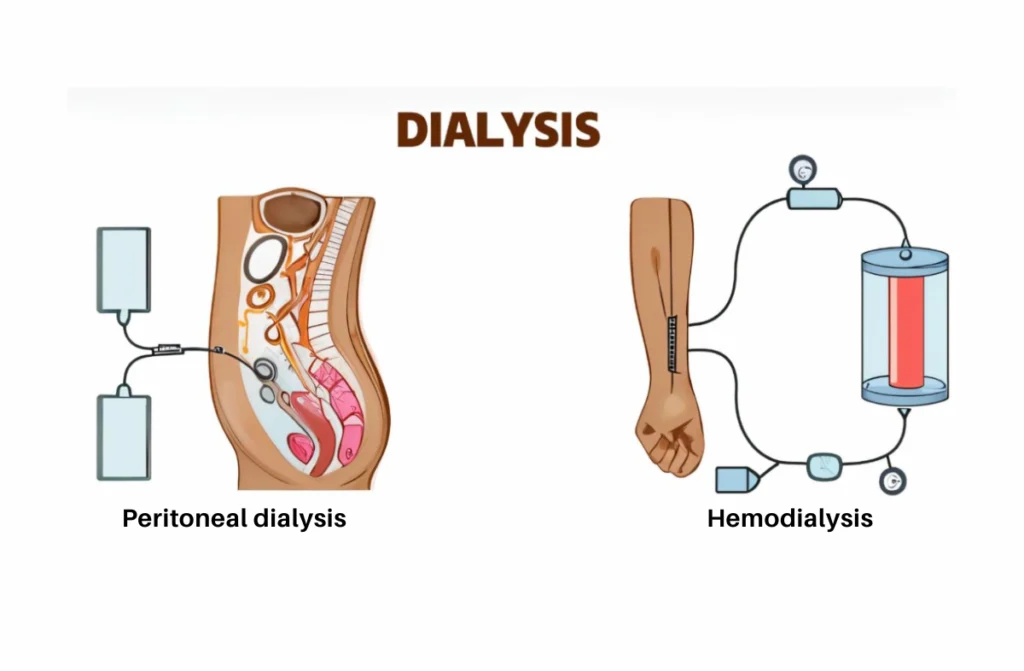The 2 types of dialysis—hemodialysis and peritoneal dialysis—are essential treatments for individuals living with kidney disease. At CTS Hospital, we focus on patient-centered care, providing advanced treatment options and expert guidance. By understanding these treatment methods, patients and their families can make informed decisions to achieve better health outcomes and manage their condition effectively.
What Is Dialysis?
Dialysis is a vital medical procedure that takes over the job of the kidneys when they are no longer able to function properly. It removes waste products, excess fluids, and toxins from the blood, preventing harmful buildup in the body.
The 2 types of dialysis—hemodialysis and peritoneal dialysis—are designed to meet different medical needs and lifestyle preferences. At CTS Hospital, we customize care plans to suit each patient’s unique condition, ensuring the best possible outcomes.

Why Dialysis Is Essential
When kidney function declines, dialysis becomes a crucial treatment to maintain the body’s balance. Dialysis helps to:
- Remove toxins and excess fluids that the kidneys can no longer filter.
- Regulate blood pressure and maintain the balance of electrolytes in the body.
- Prevent life-threatening complications like fluid overload and uremia.
At CTS Hospital, we emphasize the importance of dialysis in preserving health and improving quality of life for patients with kidney failure.
Exploring the 2 Types of Dialysis
Hemodialysis: The First Type of Dialysis
Hemodialysis is one of the most common 2 types of dialysis. It uses a machine, called a dialyzer, to filter toxins and excess fluids from the blood.
- How It Works: Blood is taken from the body, cleaned by the machine, and returned to the bloodstream.
- Frequency: Most patients undergo hemodialysis three times a week, with each session lasting about four hours.
- Setting: This procedure is usually done in hospitals or dialysis centers, though some patients may choose home hemodialysis.
At CTS Hospital, our advanced facilities and compassionate staff make the hemodialysis process as comfortable as possible.
Peritoneal Dialysis: The Second Type of Dialysis
Peritoneal dialysis, the second of the 2 types of dialysis, is a more flexible treatment option that can often be done at home.
- How It Works: A special fluid is introduced into the abdomen via a catheter. The abdominal lining filters waste, which is then drained out.
- Frequency: This procedure is typically performed multiple times a day or overnight using an automated machine.
- Setting: Unlike hemodialysis, peritoneal dialysis allows patients to manage their treatment from home.
At CTS Hospital, we provide thorough training to help patients perform peritoneal dialysis safely and effectively.
After Dialysis Care: A Vital Component of Treatment
Dialysis doesn’t end with the procedure itself. Proper after dialysis care is essential to help patients recover and prevent complications.
After Hemodialysis Care
- Hydration and Rest: Controlled fluid intake stabilizes blood pressure, while rest helps the body recuperate.
- Dietary Adjustments: A kidney-friendly diet low in potassium, sodium, and phosphorus aids recovery.
- Monitoring Symptoms: Promptly report signs of infection, swelling, or unusual fatigue to your healthcare provider.
At CTS Hospital, we create personalized after dialysis care plans to ensure a smooth recovery for every patient.
After Peritoneal Dialysis Care
- Catheter Site Hygiene: Clean the catheter site daily to prevent infections like peritonitis.
- Diet and Fluid Management: Follow dietary guidelines to balance electrolytes and avoid bloating.
- Regular Check-ups: Routine visits to monitor treatment effectiveness and address potential issues.
Our team at CTS Hospital integrates after dialysis care into each patient’s routine, helping them maintain a high quality of life.
Post Dialysis Syndrome: Recognizing and Managing Symptoms
Post dialysis syndrome refers to symptoms such as dizziness, fatigue, nausea, or cramps that occur after dialysis. This condition can affect patients undergoing either of the 2 types of dialysis.
- Causes: It is often caused by rapid fluid removal, electrolyte imbalances, or low blood pressure.
- Management: Hydration within prescribed limits, gradual treatment adjustments, and medications can help manage these symptoms.
At CTS Hospital, our team closely monitors patients to prevent and manage post dialysis syndrome, ensuring comfort and safety.
Hospice Care Dialysis: Comfort-Focused Treatment
Hospice care dialysis is an approach that combines dialysis with end-of-life care to enhance comfort for patients with advanced illnesses.
- Customized Care Plans: Dialysis is adapted to prioritize the patient’s comfort and individual goals.
- Emotional Support: Counseling is offered to patients and their families to navigate this challenging phase.
- After Dialysis Care: Comprehensive support addresses both physical and emotional needs.
At CTS Hospital, we specialize in hospice care dialysis, focusing on improving quality of life for patients during difficult times.
Risks and Benefits of the 2 Types of Dialysis
Both types of dialysis have significant benefits but also carry some risks.
Hemodialysis
- Benefits: It effectively removes toxins and is closely supervised by medical professionals.
- Risks: Possible complications include low blood pressure, muscle cramps, and infections at the access site.
Peritoneal Dialysis
- Benefits: This home-based method offers flexibility and eliminates the need for needles.
- Risks: Complications may include peritonitis, hernias, or discomfort from fluid retention.
At CTS Hospital, our experienced team minimizes these risks with state-of-the-art facilities and patient-centered care.
Living Well with Dialysis: Tips for Success
- Stay Active: Light exercise improves circulation and reduces fatigue.
- Balanced Diet: Adhering to dietary guidelines helps maintain fluid and electrolyte balance.
- Emotional Support: Join support groups or seek counseling to cope with the emotional challenges of dialysis.
- Regular Monitoring: Routine check-ups at CTS Hospital ensure any issues are addressed promptly.
Comprehensive Care at CTS Hospital
At CTS Hospital, we provide holistic care for patients undergoing the 2 types of dialysis. From initial education to managing after dialysis care and addressing post dialysis syndrome, our team is committed to supporting patients at every stage.
Conclusion
The 2 types of dialysis—hemodialysis and peritoneal dialysis—are life-saving treatments for individuals with kidney failure. At CTS Hospital, we are dedicated to providing exceptional care, helping patients manage their treatment with confidence. Whether you need assistance with hospice care dialysis, post dialysis syndrome, or routine after dialysis care, our experts are here to guide you. Contact CTS Hospital today to learn more about how we can support your kidney health and improve your quality of life.
